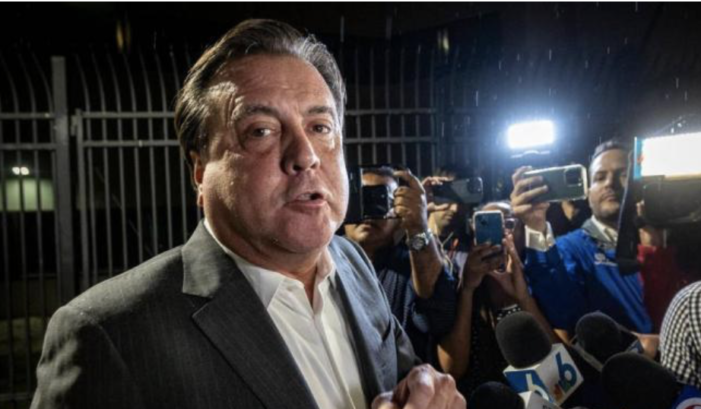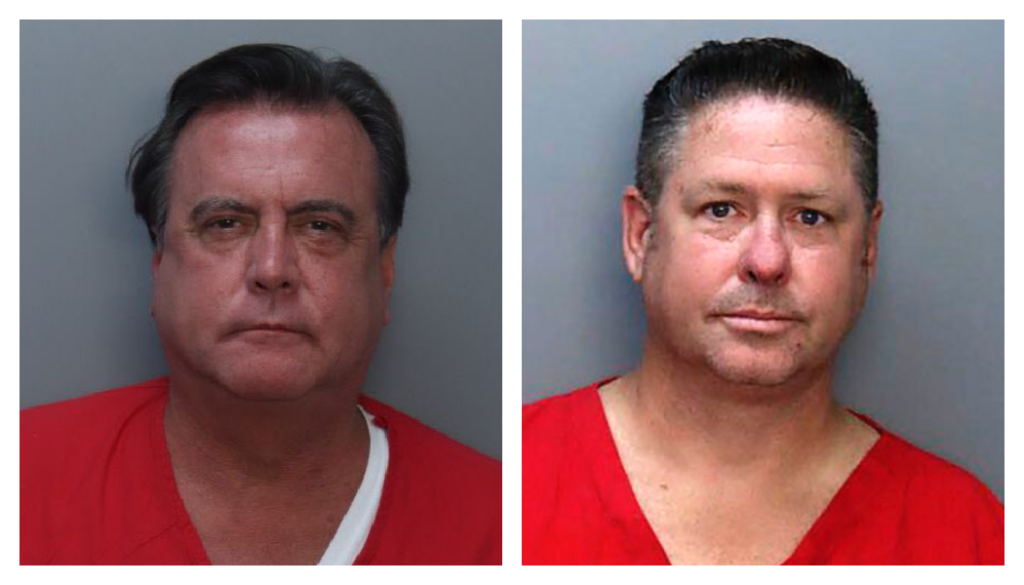Broward prosecutors on Wednesday announced that they had dropped the public corruption charges against former Miami Commissioner Alex Diaz de la Portilla, arrested in September of last year, basically because they couldn’t make the case.
‘This case fails to meet the legal standards for prosecution,” wrote Broward Assistant State Attorney Kayla Bramnick in her close-out memo. “The evidence does not demonstrate corrupt intent, unlawful benefits, or falsification of records. Witness testimony is unreliable, and lawful actions have been misconstrued as criminal.
“Substantial follow-up investigation and depositions have occurred that revealed the foundation of this entire investigation was misguided and buttressed by unverified information. In a purely circumstantial case, as opposed to a case with direct evidence, the State is required to present competent evidence inconsistent with the Defendant’s theory of defense. Here, the State does not possess competent evidence to present to a jury that would allow them to exclude every reasonable hypothesis of innocence beyond a reasonable doubt, particularly the hypothesis that each of these acts were suspicious but legal.”
Suspicious?
Central to the decision, according to the Bramnick memo, is the standing of a prior proposal to use the public space at Biscayne Park for a Miami-Dade Public School project — which was not the point.
What does one thing have to do with the other?
It’s totally irrelevant if the plan to build the MDCPS iPrep Academy was dead in the water or not when Diaz de la Portilla decided to sponsor the item that gave a licensing agreement to The Centner Academy to build a $10 million sports complex that would be for use by their students only some of the time and for the public one third of the time — but maybe for a fee. The school plan has nothing to do with the $245,000 given to ADLP’s political action committee through a newly-formed Delaware company. The school plan had nothing to do with the 57 days that Diaz de la Portilla stayed at the East Hotel in downtown Miami, racking up $30,000 in expenses paid for by the attorney for the owners of the Centner Academy, or, more likely, the owners of the Centner Academy through their attorney, William Riley, who was also arrested.
Read related: Miami’s Alex Diaz de la Portilla arrested on corruption, pay-for-play park deal
And, in fact, it wasn’t dead until Diaz de la Portilla became involved. When the Centner’s owners talked to former Commissioner Ken Russell, who was the Omni CRA chair before ADLP, there was still a path for both the private school and the public school board to work together. In fact, when Russell voted for the Centner’s sports dome, he said he wanted the conversation to include the school board and their needs.
But still, that plan had nothing to do with the scheme that Diaz de la Portilla Riley planned, which led to the 11 felony charges against the commissioner, including bribery and money laundering. Prosecutors don’t file felony charges against an elected without plenty of probable cause (read: evidence) because they know the case will be followed and scrutinized by the press. Suddenly the evidence was weak?
ADLP’s main attorney, Ben Kuehne, issued a statement on Wednesday that sounds like sermon.
“Today is a day of Celebration for the return to Justice and Fairness in our court system with the decision of the Broward County State Attorney to Drop all charges against Alex Diaz de la Portilla,” Kuehne wrote. His caps, not mine.
“This is a day of complete Vindication for Alex, who did not do anything wrong. We thank the Broward State Attorney’s Office for its thoughtful and correct decision that ends the weaponized use of prosecutorial power in this case.
“When this case was first brought at a time chosen for election interference, Alex Diaz de la Portilla promised the community that he had done nothing wrong. Today is a clear demonstration of the fulfillment of his promise.
“As the Broward State Attorney’s Office confirmed in its detailed Close-Out Memo: ‘The evidence does not demonstrate corrupt intent, unlawful benefits, or falsification of records. Witness testimony is unreliable and lawful actions have been misconstrued.'”
Read related: Private Centner Academy gets to run Miami public park for $10 million
Kuehne further expressed ADLP’s thanks to God and “those in the community who continued to express their unwavering support.” Then he said Alex had recently quoted Dr. Martin Luther King, Jr., saying, “We shall overcome because the arc of the moral universe is long but it bends toward justice.”
Doesn’t sound at all like him. That’s all Ben.
Kuehne, as always, took the opportunity to pat himself on the back, saying that Diaz de la Portilla recognized the efforts of his legal team, which also included Michael T. Davis, and Johan Dos Santos of Kuehne Davis Law, P.A., Jonathan K. Osborne and Miguel Diaz de la Portilla of Gunster, Richard J. Diaz, and Susy Ribero-Ayala.
He should have included Bramnick, whose close out memo sounds more like the office worked hard to find reasons why not to prosecute, instead of the other way around. In fact, it kinda sounds like Kuehne wrote it based off the depositions taken by the defense.
“While these allegations raise serious concerns, a thorough review of the evidence that has been discovered through extensive follow-up investigation and depositions reveal significant weaknesses in the case,” Bramnick wrote in the memo. “Witness testimony proved inconsistent and critical elements of the crimes charged cannot be supported by the evidence.”
Testimony from three key witnesses “was undermined during depositions,” she wrote, throwing them under the bus:
- Commission of Ethics Investigator Karl Ross, allegedly “admitted to limited familiarity with relevant laws and failed to independently verify key allegations, such as the existence of the MDSB proposal.”
- Former Omni CRA Director Jason Walker recanted, “acknowledging that the MDSB project was stalled due to unrelated priorities and not because of ADLP’s actions.”
- Former City Commissioner Ken Russell, who “made contradictory statements, later admitting he had no firsthand knowledge of the Centner proposals progression after he left office.”
None of that sounds right. Or, again, relevant at all.
Ladra knows Ross, a former investigative reporter at the Miami Herald. He knows the law pretty damn good. Better than some attorneys. Ladra knows Walker didn’t recant. His explanation of the timeline of events was misinterpreted. The project was stalled over the extension of the CRA, which is still not approved by the commission as it has been held hostage by the District 1 commissioner who wants to expand it into Allapattah (more on that later).
Read related: Centner Academy pulls out of shady Miami deal to take over public park
And what does Russell’s “firsthand knowledge” of The Centner Academy proposal once he left office have to do with ADLP giving away the park for campaign contributions, booze and hotel stays? Absolutely nothing.
Several people with key information on the case said they haven’t talked to prosecutors in months — or at all.
And what about the investigation into possible witness tampering after his former chief of staff reported that he had sent her text messages about her witness testimony that were “intimidating and obviously meant to tamper with my presentation of complete and truthful testimony,” the former staffer told authorities.
It sounds like Bramnick wasn’t sure that she could win and didn’t want another L on her record. But that’s not her job, to keep a good record. Her job is to seek justice. And she failed this time. Miserably.



